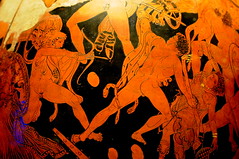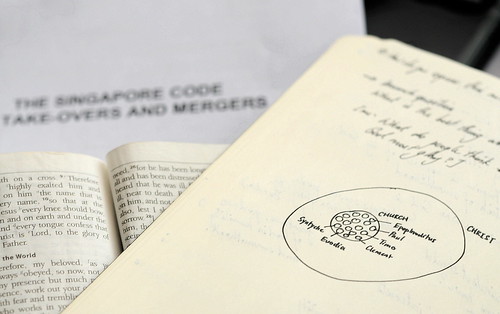"We're back from the National Museum," gushed the parentals some months ago, waving about Greek Masterpieces From The Louvre brochures, "they've brought in sculptures from the Louvre. You must go and see them!"
"But we've seen them...at the Louvre!"
"Did not."
"We did. We went to the Louvre, you criticised I M Pei's pyramid, then you said you were bored and wanted to go shopping."
"Oh."
In any case, last Sunday, after Peter O'Brien'd delivered his 64th talk in the last 3 months, I popped across the road to the museum for a gawk.
 Surrounding David by Titarubi.Poor old David's so commodified he's attained pink kebaya-cloth kitsch-ness.
Surrounding David by Titarubi.Poor old David's so commodified he's attained pink kebaya-cloth kitsch-ness.
The exhibition was fairly small but decently and thematically-curated. Peter O'Brien, being a bit of a scholar in Paul's New Testament letters, had, earlier in the day, painted many word-pictures and made many references to cultural context in which the letters had been written. Even though these statues preceded Paul by a century, there were probably quite a few of them still mooching around with their Augustan brothers when Paul gandered about Athens during the Late Roman Empire (Acts 17:16-34).
To my initial shame, having always been fond enough of Greek/Roman literature to have an entire bookcase on the subject and Greek/Roman-themed BBS rooms, my main reaction to some (because others looked like really bad copies) of these drapped bodies was one of great appreciation: the proportionality of facial features, bodies and limbs, the rendering of wet himations, and how nice it'd be to have a quiet empty museum for a sit around and a charcoal sketch.
But Paul, I thought when I got home and had a flip through the Book of Acts, had got it spot on. Upon seeing these beautifully proportioned idols, he did not bring out the sketchpad. Instead, his spirit was provoked within him. Barely able to contain himself, he went about arguing against the wisdom of that age, reasoning with Jews and devout persons and professional philosophers (Acts 17:16-34). So my reaction of great appreciation = FAIL. But someone later pointed out: all cultural lor. Not idols to ppl of our time liao.
 Pardon me, but your butt is cracking.
Pardon me, but your butt is cracking.
Nevertheless, such utter incompetence in even identifying the right reaction in any given stimulus is probably a good impetus for prayer. (We had an interesting semiological debate in our DG about the word "prayer", but that's another post.)
Notes from Peter's talks on prayer:

In his letter to the Colossians, Paul tells them that he is constantly praying for them (Colossians 1:3,9). He asks of God because he knows that God is generous and will not withhold good things from his children. What does Paul pray for? He prays that they will be filled with knowledge so they will please the Lord (Colossians 1:9-10). He prays that they will have all spiritual wisdom and understanding. This wisdom and understanding is not what we think of as guidance from God, not "Lord, what do you want me to do?". Rather it is more about what God wants done in his world and how we can fit into God's plan for the world.
And what pleases God? Bearing fruit in every good work (Colossians 1:10b). This does not mean being successful in God's work by the world's standards, but having the fruit of the Spirit to be enabled to do things in a godly way, in growing in love for Christ, in wanting to know Jesus more and more.
It's all very well to talk about these things but how will we be able to do them? Through being strengthened in all power by the Spirit (Colossians 1:11). This same power, this same Spirit, raised Christ from the dead. So it's pretty lethal stuff.
Then Paul returns to thanksgiving. We have all been transferred from the dominion of darkness to the kingdom of light. Gaining citizenship of a country like Singapore or Australia's pretty difficult, but the difficulty level is nothing compared to trying to gain citizenship of heaven. Yet, Christians have achieved it through the forgiveness wrought for them in Jesus Christ. It is not only children who find it hard to say "please" and "thank you". Adults struggle as well. The writer of Hebrews tells us that we can now enter God's throne room with boldness. This should encourage us to pray prayers of thanksgiving.
Suffering and Weakness (Romans 8:18-30)
Voltaire was of the opinion that God either couldn't stop suffering or that he had the ability to do so but wouldn't.
We all live in the midst of suffering. But we are told that we are heirs of God and co-heirs with Christ. We will share in his suffering before we share in his glory. This tension is not just individual, it is also corporate.
Paul's thesis on suffering and glory is in Romans 8:18 - "For I consider that the sufferings of this present time are not worth comparing with the glory that is to be revealed to us". Paul was no stranger to suffering. In 2 Corinthians 1, he told the Corinthians that he was being utterly and unbearably crushed; he was so close to death that it was only a whisker away. Paul didn't have a silver spoon in his mouth. But he believed that the glory to come was a sure and certain thing. If it wasn't, then we would do all sorts of things to put our present suffering out of our minds, to try futilely to gain security, to distract ourselves.
The whole of creation is bound up with suffering (Romans 8:20). It was knocked off its perch of God-centredness because of Adam's sin. But again there is the promise that after this suffering will come glory when the sons of God come into glory (Romans 8:21-22). Suffering and glory go together.
And we Christians also groan inwardly (Romans 8:23). We were adopted as sons of God when we first trusted in Christ. But we now wait for that final adoption and the redemption of our bodies. Every time we have to visit the pharmacist or the doctor we are reminded of how our bodies have yet to be redeemed.
And as we wait in hope for this redemption, we continue to suffer and struggle. We are weak. Part of our weakness is that we don't know what we ought to pray for, "ought" meaning in accordance with God's will. This is part of our suffering. There are some people who approach the throne of God with such boldness that they keep telling God what they want over and over again. And when they don't get what they want, they blame God. There are other people who are just at a loss about what to pray for.
But, Paul says, the Spirit helps us in our weakness, interceding for us with groanings too deep for words (Romans 8:26). There is a content to the Spirit's prayer that we don't know about. Paul is not talking about speaking in tongues. The groanings of the Spirit are wordless. And God who searches hearts knows the mind of the Spirit, not just theoretically but the content of intercessions of the Spirit that are in line with his will. And God answers the intercessions of the Spirit. When we pray, we fire arrows at a target which may go far wide. The Spirit redirects the arrows to make sure we hit the bullseye everytime.

For those who love God, all things work together for good (Romans 8:28). God works our good through things that were meant to harm us. Joseph, for example. was sold off by his jealous brothers (Genesis 37). After his many adventures in foreign lands, where he was ill-treated and thrown into prison, Joseph met his brothers again. He was now in a position of power and he could have had them killed (Genesis 42-45). But instead he recognised God's hand in his situation, even where his brothers meant evil, God meant it for good. God had sent him to Egypt before them to preserve their lives (Genesis 45:5-8). This does not mean that there are 2 different experiences but that the 2 are sandwiched into 1, the clearest example of this being the death of God's own Son. Wicked men meant for the destruction of Jesus and they will be held responsible for their actions, but their evil was used by God, and infact predestined by God, for good.
We are encouraged to call upon God. His answer to us will not be brilliance in analysing our situation or in summarising the problem. He will not answer us because our motivation is 100% pure because we are wretchedly corrupt. God will answer us because the Spirit intercedes for us.
And we know that God has infinite resources (Ephesians 3:20). Not only that, but also God doesn't hide away his resources like Scrouge. God gives lavishly. God wants to give abundantly. It's almost as if God is waiting to be asked so that he can give.
Faced with the reality of our own weakness, living in a world that is suffering, prayer is real and practical now. We do not need to wait until we are better before we can pray, nor must we do this or that before we can pray.
Prayer: slick? Unrealistic claims? Full of promises too good to be true? (Philippians 4:6-20)
Slick solution? (Philippians 4:6-9)
The poor Philippians were being pressured from without and being given a hard time. But whatever they were distressed about, Paul told them to be anxious about nothing and instead present their requests to God. ("Anxious"ness being unreasonable heresying care.) This sounds like a slick platitude but Paul was in prison then and knew what he was talking about.
God knows all needs. He clothes the lilies of the field etc (Matthew 6:28-33). They weren't to tell God about their needs because he didn't know them and needed to be updated. But by bringing their requests to him and laying their troubles upon him, they were to demonstrate their dependence on him. And this would strengthen their faith.
Did this mean that all our prayers will be answered? Philippians 4:7 promises one sure result: that the peace of God, which surpasses all understanding, will guard your hearts and your minds in Christ Jesus. Whether our particular petition is granted or not, we are assured of divine protection against everything. "Peace" isn't a feeling of peace but is that something objective that was done on the corss (Romans 5:1) - reconciliation and salvation. And this peace "transcends all understanding" and is more wonderful than they could imagine.
Philippi was settled by many retired soldiers who had the protection of a garrision or guard. This peace, said Paul, would similarly keep guard over their hearts and minds, those areas of their lives that were vulnerable to attack from desperate heresying care.
Do not be anxious but instead pray and God will guard your hearts and minds. The promise given in Philippians 4:7 is not slick. As I reflect on what God has done for me, this guards me against all sorts of wretched fears.
I can do everything! Unrealistic claim? (Philippians 4:10-13)
"I can do all things through him who strengthens me." says Paul. Will nothing be beyond our capabilities if we pray, if we had the same faith that Paul had? But yet, Paul had an extremely long list of things he still suffered (2 Corinthians 11). This is not a triumphalistic promise.
The context explains the promise. Paul says that he is content in all circumstances. He has experienced life at both ends of the economic spectrum and he knows how to live at both ends.
How does he do this? Through Christ who gives him strength. He can do all things, that is, be content in all things through Christ. Compare this with the Stoics who taught that the happy man was the content man. The content man was content in and of himself, due to his innate resources. But Paul knew that it was when he was most conscious of his inadequacy (2 Corinthians 12) that he could most rely on God.
Every need met! A promise that is too good to be true? (Philippians 4:14-19)
The doxology in Philippians 4:19-20 brings to a close the thanks to the Philippians. They have supplied Paul's needs, God will supply theirs. This is not a reciprocal tit-for-tat.
"Every need" does not mean just material things like money, but also the whole host of things that they were up against. They needed to stand firm in persecution (1:27-30), they needed unity where there were divisions (eg. between the 2 quarrelling ladies forever immortalised for posterity in the Bible), they needed to shine like stars in the universe even though they were under pressure.
"in glory" - these needs which they had would be met gradually and partially in the present but would be met fully at the end.
"in Christ Jesus" - Jesus is the only one in whom God's promises are fulfilled. Therefore, only when they are united with him fully would all their needs be met.
Our Spiritual Battle, the Devil and Prayer (Ephesians 6:10-20)
The spiritual dimension in Christianity is often ignored, whether in moral decay or in evangelism. This may have more to do with the Enlightenment than with Scripture. Scripture describes things from the world's viewpoint and also from a cosmic dimension. We neglect these things at our peril. We will not be seeing things as God sees them.
God has already won the decisive victory but the Devil and his minions still exist and still act even though they have lost. They will do anything to snatch away the Word when it is preached. This is especially so at morning tea after Sunday service when people will talk about anything but God's Word. The Devil distracts people so that they do not come to repentance.

The attacks against us can be one temptation over and over again. But the Devil can also switch tactics. He has variety and range. The attacks can be internal and external. Uncontrolled anger and the telling of falsehoods are not from the Devil but he can use them to cause strife within the body of Christ.
What is our strategic objective in the battle? It is to stand firm (Ephesians 6:11, 13,14), to stand up against evil powers. We are not to move ahead (which infact, might be a serious wrong) but to stand firm.
Can we take on such a formidable foe with just our own resources? No. But we can do this by relying on the power of God (Ephesians 6:13ff). In actual fact, the victory has already been won by Jesus Christ on the cross. The Devil's final defeat is imminent. Soon, everything will be subject to Christ. We don't have to try to win that victory over and over again. But for the battles in the meanwhile, God has provided mighty armour for us. This is the same armour that the Lord of Hosts fights in in Isaiah 59 and the armour that God's Messiah wears when he goes out to do battle in Isaiah 11. This armour that God himself wears we also wear. This armour is made of truth, righteousness and salvation - aspects of God himself. When we put on the Lord Jesus Christ at conversion, we put on his aspects, his armour.
The breastplate of righteousness is protection in knowing that we are right with God. We can't be blackmailed. The Devil cannot tell us that we aren't a good Christian because we haven't read the Bible or haven't prayed. Who will condemn us when Jesus has died for us? If we aren't sure of ourselves, we won't share the gospel. This is the ploy of the Devil.
The sword for battle, the sword of the Spirit, is also the same one used by the Messiah in battle.

Prayer is essential and crucial to our being armed. Standing firm and prayer are interlinked.
Summary
Thanksgiving is a mark of being Christians. The world may raise complaints and concerns to an art form, but the Christian is forever thankful because we have been transferred from darkness to light.
The Christian may find it difficult to pray aright. But the Spirit, who intercedes for us, hits the bullseye everytime.
There are some promises in Scripture that aren't what we want them to be. They must be read in their contexts.
We need to pray because our struggles are also in the cosmic dimension. The world is natural, the flesh is natural but the Devil is supernatural. If we live only as if there is the world and the flesh but no Devil, we misread the battle. There are ministers of Satan who will tell falsehoods and who are disguised as ministers of the gospel.
But when Jesus clothed us at conversion, he clothed us with armour that the Devil cannot destroy.
Labels: *Colossians, *Ephesians, *Philippians, *Romans, Museum-mooching, Persevering, Prayer, Suffering















































